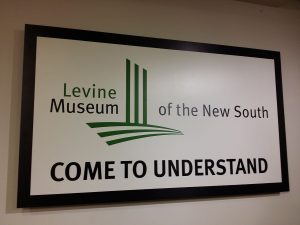by Maggie Hoffman
Although North Carolina has as much queer history as anywhere else in the country, the state’s conservative Southern roots have effectively muted that legacy. In 2014, museum professionals at the Levine Museum of the New South in Charlotte made an effort to correct that transgression in the form of an exhibit: LGBTQ Perspectives on Equality. The first LGBTQ+ history exhibit ever installed in Charlotte, LGBTQ Perspectives was a dynamic, substantial display of queer history both in and out of the Tarheel state.
Since its founding in 1991, the Levine Museum of the New South has become an established attraction in Charlotte. It bills itself as “an interactive history museum that provides the nation with the most comprehensive interpretation of post-Civil War southern society.” Past exhibits have included “Focus on Justice: Carolina Photographers and the Civil Rights Movement,” “Down Home: Jewish Life in North Carolina,” and “From Cambodia to Carolina: Tracing the Journeys of New Southerners.”
In a North Carolina Public Radio (WUNC) interview, Janeen Bryant, former Vice President of Education and Programs for the Levine Museum, noted that LGBTQ Perspectives on Equality was two years in the making. Opened to the public on July 25th, 2014, the exhibit suite included four sub-exhibits:
- Publicly Identified: Coming Out Activist in the Queen City
- Out of the Shadows: Gay America from Kinsey to Stonewall
- Pauli Murray: Imp, Crusader, Priest, Dude
- Minding the Ts and Qs: Gender Identity
Publicly Identified took the form of a timeline that presented noteworthy accomplishments and milestones in Charlotte’s LGBTQ+ community from the 1940s through present day. Out of the Shadows—an exhibit loaned to the Levine Museum by the Stonewall National Museum & Archives—took a step back, highlighting important aspects of LGBTQ+ history on a national level. Pauli Murray explored the life and accomplishments of Durham-raised Pauli Murray, a Black feminist, activist, author, priest, and lawyer. These exhibits were designed fairly traditionally, using didactic panels and images to relay history. As a contrast to that design, Minding the Ts and Qs made space for visual artists to explore the complex dynamics of gender identity.
With this calculated combination of exhibits, the Levine Museum tackled an issue of national importance and placed it in a local community context. It considered the past and present of the LGBTQ+ community, using both traditional and non-traditional practices. Regarding the Publicly Identified timeline, Josh Burford, Archivist and Assistant Director for Sexual & Gender Diversity at UNC-Charlotte, explained that he’d consciously created a network of community members, involving business owners and local activists in assembling the history.
According to Janeen Bryant, the project received an overwhelmingly positive response from patrons. Reception within the field was similarly affirming, with the Levine getting calls from community organizations looking to collaborate. Archivists and museum professionals throughout the country praised the Levine’s efforts.
While positive public reception and praise by fellow museum professionals are certainly commendable, they aren’t the only markers of success. It is worth adding that this exhibit suite was immensely personal for many of the patrons and professionals who engaged with it, including Archivist Josh Burford:
I think as Southerners, especially Queer Southerners, there’s a sense that we don’t really exist—that we’re always escaping and going to other places. And what I’ve discovered working on this project is that’s just not true. That we stayed, and we worked, and we’ve done work, because it’s the South, and not in spite of the fact that we live in the South.
As a Queer Southerner, I recognize the immense value in this type of representation, especially at an institution as respected as the Levine Museum of the New South. I applaud the efforts of the Levine Museum not only as a professional familiar with the inner-workings of museums, but as a North Carolinian who wishes this exhibit could’ve been put on ten years earlier.
. . .
To read more about LGBTQ Perspectives on Equality, check out qnotes, a North Carolina LGBTQ community newspaper. You can also visit the Levine Museum’s recaps on Publicly Identified, Out of the Shadows, and Pauli Murray.

